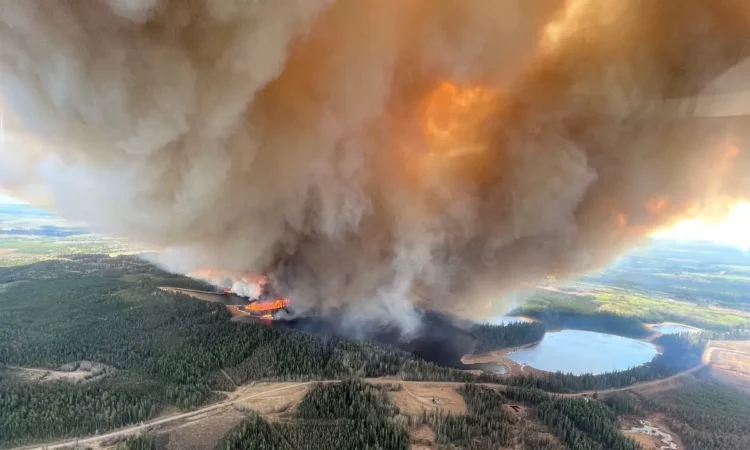From British Columbia to Nova Scotia: Wildfires Spread Across Canada
Canada, known for its vast wilderness and breathtaking landscapes, is currently grappling with a nationwide wildfire crisis that has spread from British Columbia to Nova Scotia. As the flames continue to devour forests, threaten communities, and wreak havoc on ecosystems, the extent of the damage is becoming increasingly evident. This article delves into the escalating wildfire situation across Canada, examining the causes behind the outbreak, the environmental and socioeconomic impacts, and the urgent need for concerted efforts to mitigate the crisis.
I. The Canadian Wildfire Crisis Unfolds:
A. The Geographical Extent:
- Wildfires engulfing provinces from British Columbia to Nova Scotia.
- The scale of the wildfires and their impact on diverse ecosystems.
- The challenges faced by firefighters in combating the rapidly spreading flames.
B. Causes of the Wildfire Outbreak:
- Climate change as a contributing factor.
- Drought conditions and record-breaking temperatures.
- Human activities and their role in fire-prone landscapes.
C. The Toll on Human Lives and Communities:
- Evacuation efforts and the displacement of residents.
- Damage to infrastructure, homes, and livelihoods.
- Psychological and emotional impact on affected individuals and communities.
II. Environmental Impacts and Ecological Consequences:
A. Forest Destruction and Biodiversity Loss:
- The destruction of vast forested areas.
- Loss of habitat for wildlife species.
- Long-term consequences for biodiversity and ecosystem health.
B. Air Quality and Health Risks:
- Smoke and pollutants spreading over large areas.
- Implications for air quality and public health.
- Vulnerable populations at higher risk of respiratory issues.
C. Carbon Emissions and Climate Change:
- The release of greenhouse gases exacerbating climate change.
- The feedback loop between wildfires and warming temperatures.
- Long-term implications for global climate patterns.
III. Socioeconomic Implications and Community Resilience:
A. Economic Losses and Disruptions:
- Impact on local industries, including forestry and tourism.
- Challenges faced by small businesses and the service sector.
- Long-term economic recovery and rebuilding efforts.
B. Indigenous Communities and Cultural Heritage:
- Indigenous land stewardship practices and their role in wildfire management.
- Impacts on Indigenous communities and their connection to the land.
- Collaborative approaches to wildfire prevention and recovery.
C. Community Resilience and Adaptation:
- Fire-smart strategies for communities in fire-prone regions.
- Support systems for affected individuals and communities.
- The importance of community collaboration and preparedness.
IV. Mitigation and Future Considerations:
A. Strengthening Fire Management Strategies:
- Early detection systems and surveillance technologies.
- Enhanced firefighting capabilities and resources.
- Knowledge sharing and collaboration among provinces.
B. Climate Change Mitigation and Adaptation:
- Reducing greenhouse gas emissions and promoting sustainable practices.
- Investing in renewable energy and transitioning away from fossil fuels.
- Enhancing resilience to climate change impacts.
C. Public Awareness and Education:
- Educating communities about wildfire risks and preventive measures.
- Promoting responsible land use practices and fire-safe behaviors.
- Engaging citizens in climate action and wildfire preparedness.
The unprecedented spread of wildfires across Canada, from British Columbia to Nova Scotia, has highlighted the urgent need for comprehensive action to address the escalating crisis. The devastating impact on forests, ecosystems, communities, and the environment at large necessitates immediate attention and collaborative efforts.
Mitigating the Canadian wildfire crisis requires a multifaceted approach. Firstly, there must be a focus on addressing the root causes, including climate change. Reducing greenhouse gas emissions, transitioning to clean energy sources, and implementing sustainable land management practices are critical steps towards minimizing the risk of wildfires. Additionally, investing in advanced firefighting techniques, early detection systems, and adequate resources is crucial for effective fire management.
Public awareness and education play a pivotal role in mitigating the wildfire crisis. Communities need to be informed about the risks, preventive measures, and responsible land use practices. Emphasizing the importance of preparedness and fostering a culture of resilience can empower individuals and communities to take proactive steps in safeguarding their lives and properties.
Furthermore, collaboration and knowledge-sharing among provinces are vital to combat the widespread nature of the wildfire crisis. Sharing best practices, expertise, and resources can enhance firefighting capabilities and improve emergency response strategies.
As Canada grapples with the ongoing wildfire crisis, it is essential to recognize the resilience and strength of affected communities. The support and assistance provided to those impacted by the fires are crucial in facilitating recovery and rebuilding efforts. This includes financial aid, infrastructure rehabilitation, and mental health support for individuals who have endured trauma and loss.
Ultimately, the wildfire crisis in Canada serves as a stark reminder of the need for proactive measures to address climate change, protect ecosystems, and build resilient communities. It calls for collaboration between governments, communities, indigenous peoples, and various stakeholders to develop sustainable solutions and adapt to the changing climate.
By implementing comprehensive fire management strategies, reducing greenhouse gas emissions, and fostering community resilience, Canada can strive to mitigate the impact of wildfires and protect its natural heritage for future generations. The unity and determination displayed in addressing this crisis can serve as a blueprint for global efforts in combating climate change and preserving our planet’s fragile ecosystems.
In facing the widespread devastation caused by wildfires, Canada has an opportunity to demonstrate leadership in environmental stewardship and inspire international cooperation towards a more sustainable and resilient future. Through collective action, the nation can rise above the challenges posed by wildfires and pave the way for a safer and greener world.



No Comments
Leave Comment